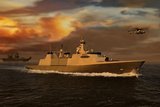Croatia orders new patrol vessels from Vittoria Shipyard
Throughout the company's history, it has received international orders from Greece, Malta, Cyprus, Croatia, Slovenia, Russia, Romania, Libya, Tunisia, Algeria and Oman. (Photo: Vittoria Shipyard)
Vittoria Shipyard has signed a contract with the Ministry of the Interior of the Republic of Croatia for the design and construction of two 21m coastal patrol vessels for use by law enforcement.
The contract is worth over 49 million Croatian kuna ($7 million), co-financed by the EU as part of the Frontex external border management programme, and is scheduled to be delivered in 2023.
The two 6.5m-wide, 21.5m-long vessels will be constructed out of aluminium. Although the vessel class has not been disclosed, it may be similar in construction to the C825 P200, which has a similar size and engine power.
Equipped with a screw propeller and two 1,213kw MAN engines, they are capable of reaching a top speed of over 31 knots.
In addition to crew quarters, the ships will have a sickbay and an additional shipwreck shelter.
Vittoria Shipyard provided the Croatian police with five river border patrol vessels and five unsinkable and self-righting SAR vessels, which are still in use, in 2004 and 2008 respectively.
Later, in 2017, the company provided another self-righting SAR vessel to the Croatian Harbor Master Office.
This new contract confirms and builds upon the reputation Vittoria Shipyards has gained by supplying the Balkan nation with vessels.
More from Naval Warfare
-
![Spain’s F100 upgrade mirrors Aegis modernisation paths in allied navies]()
Spain’s F100 upgrade mirrors Aegis modernisation paths in allied navies
The Spanish Navy’s Alvaro de Bazan-class of air defence frigates will receive the latest Aegis Weapon System technology among other modernisations to extend the service life to 2045.
-
![UK’s Fleet Solid Support ship programme deemed on track despite steel supply concerns]()
UK’s Fleet Solid Support ship programme deemed on track despite steel supply concerns
Shipbuilders are saying the programme is going ahead on time as the government estimates 7.7 million tonnes of steel are needed for 2026 infrastructure projects.
-
![As Indonesia doubles up its order, who else is looking at the Arrowhead 140 frigate design?]()
As Indonesia doubles up its order, who else is looking at the Arrowhead 140 frigate design?
The adaptable design of Babcock’s Arrowhead 140 frigate, already selected by the UK Royal Navy and Poland, has led to more orders from Indonesia while other countries continue to weigh it up.






















